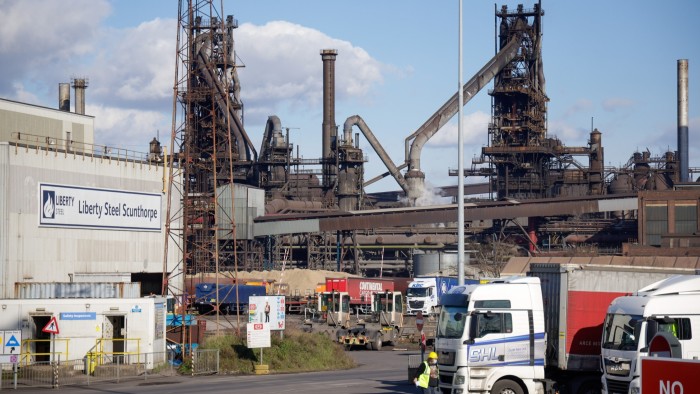Unlock the Editor’s Digest for free
Roula Khalaf, Editor of the FT, selects her favourite stories in this weekly newsletter.
Taxpayers stand to lose up to 80 per cent of what they are owed by Sanjeev Gupta’s Liberty Steel under a proposed restructuring of one of its main UK steelmaking units.
Liberty Steel said on Monday it planned to restructure its Speciality Steel UK business, which includes its main operating sites in Yorkshire, to significantly reduce its debts and avoid insolvency. The restructuring, it said, would have no impact on the company’s 1,500 employees and had the backing of its customers.
Details of the restructuring, in a letter sent by Gupta on behalf of Speciality Steel UK on November 6 and seen by the Financial Times, reveal that some creditors would stand to lose much of what they are owed under the plan.
The company has blamed the financial woes of the Yorkshire-based steel operations on the impact of the Covid pandemic, weak steel markets and debts from the collapse of Greensill Capital, the main lender to his GFG Alliance conglomerate. The Serious Fraud Office opened a criminal investigation into suspected fraud, fraudulent trading and money laundering at GFG shortly after Greensill’s collapse. GFG has denied wrongdoing.
The scale of Speciality Steel’s overall debts are unclear as the company has not filed audited accounts for nearly five years. Its latest filed accounts showed that in March 2019 it had total liabilities of £245mn. Gupta is being prosecuted over his alleged failure to file accounts in the UK for more than 70 companies, including Speciality Steel. The steel magnate pleaded not guilty at a hearing earlier this year.
According to the letter, claims by HM Revenue & Customs would be reduced by 80 per cent in the restructuring.
Britain’s tax authority two years ago filed several winding-up petitions against four of Gupta’s businesses, including Speciality Steel UK, over unpaid VAT and monies due under the pay as you earn (PAYE) system for staff workers. According to court filings at the time, Speciality Steel UK owed just under £20mn.
HMRC’s petitions were withdrawn after both sides agreed on a payment plan.
Another creditor, Together Commercial Finance Limited, would see its claims repaid in full and in cash, according to the letter. However, the lender would be paid in instalments, with the final payment not due until September 2027.
Together declined to comment.
Speciality Steel’s so-called “Greensill creditors” — comprised of investors in an invoice financing facility the now defunct finance firm arranged — will receive a small cash payment and the right to a share of future recoveries Speciality Steel’s parent company makes on the business’s shares.
Gupta’s letter states that the company understands that Switzerland’s UBS and Germany’s Greensill Bank “may have been assigned some or all” of the invoices under this facility. UBS inherited the exposure after acquiring Credit Suisse and its asset management arm, which lost billions of dollars on Greensill-related investments, while Greensill Bank was the group’s German banking subsidiary that also collapsed in part due to its exposure to Gupta’s businesses.
Creditors within the GFG Alliance including Wyelands Bank, Gupta’s British banking unit that collapsed under the weight of its related party lending, will receive nothing under the restructuring proposal.
Liberty Steel told the Financial Times that the proposed restructuring would allow Speciality Steel to “continue as a going concern while fulfilling its commitments to critical customers in the defence, aerospace, energy, and infrastructure sectors” and would deliver the “maximum possible value to creditors compared with other outcomes”.
“The large majority of the HMRC debt has been paid back, leaving just one month’s debt under the proposed restructuring,” Liberty Steel added.
UBS declined to comment and Greensill Bank’s administrator did not respond to a request for comment.
HMRC declined to comment specifically but said it took a “supportive approach” to dealing with people with tax debts, working with them to find the best solution based on their financial circumstances.
Gupta last year announced a significant restructuring of the UK steel operations that sought to cut costs and focus production on the company’s three main plants at Rotherham, Stocksbridge and Brinsworth in Yorkshire. The plants, however, have only been operating intermittently since then.
The presentation of the restructuring plan comes as the company faces a winding up petition by a group of unpaid creditors, with a hearing scheduled for next week. The company said in the letter that it intended to seek for the insolvency petition to either be withdrawn or adjourned pending the outcome of its restructuring proposal.
The proposal needs approval from 75 per cent of each class of the company’s creditors. If this threshold is not achieved, then the court has to be satisfied that none of the dissenting creditors would be worse off under a so-called “relevant alternative” plan.
Gupta’s letter states that Together would receive 29 per cent of its claim under the relevant alternative — which it considers to be a “solvent liquidation” — while all other creditors would receive nothing.
The letter also states that while HMRC would have preferential status in a liquidation it would still not be expected to receive anything under that scenario.
Alasdair McDiarmid, assistant general secretary of the Community steel union, said on Monday that Liberty’s Speciality Steel businesses were “strategically important for our country and their long-term future must be secured”.
Read the full article here

